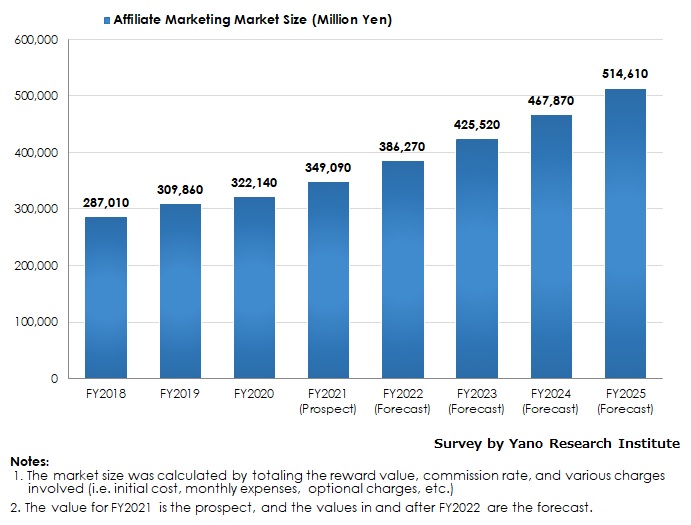No.2936
Affiliate Marketing in Japan: Key Research Findings 2021
Domestic Affiliate Marketing Market for FY2021 Prospected to rise by 8.4% from Previous Fiscal Year to attain 349,100 Million Yen
Yano Research Institute (the President, Takashi Mizukoshi) carried out a survey on the domestic affiliate marketing market and found out the market conditions and trends of affiliate service providers.

Market Overview
In FY2020, the affiliate marketing market rose to 322,100 million yen, 104.0% of the previous year, though the coronavirus infections affected some industries to reduce the advertisement placement volume, they also affected to make favorable demand from staying home, rapidly expanding the sales of some industries, which led the entire market to grow slightly.
After suppressing budgets, advertisers has resumed to increase advertisement placement volume to the level in usual years in FY2021, which is expected to recover or even expand the sales at each of major affiliate marketing service providers. However, when observing by industry, the prolonged COVID-19 crisis has made the industries that need customers visit on-site such as tourism, aesthetic salons, etc. to continue being sluggish. On the other hand, the industries such as financial and online-specific services are substantially growing.
With continuous rise in the usage rate of ecommerce in the COVID-19 calamity, companies having their stores at ecommerce platforms (ecommerce malls) such as Amazon and Rakuten while simultaneously using affiliate marketing on in-house websites are remarkably increasing the sales. The affiliate marketing market in FY2021 is projected to rise to 349,100 million yen, 108.4% of the size of the previous fiscal year.
Noteworthy Topics
Enhancement of Market Rectification Efforts, such as Intervention of Consumer Affairs Agency
One of the newsworthy topics in FY2021 can be enhancement in the efforts for market rectification. There have been some efforts for full-scale rectification by Consumer Affairs Agency by holding a meeting regarding affiliate marketing, which has begun making malicious affiliate marketing to fully withdraw.
In June 2021, administrative disposition has been implemented to the affiliate marketing that violated the regulations. This triggered to increase the cases of advertisers terminating affiliate marketing for health food, cosmetics, supplements, etc. or the cases of closing cooperative sites all at once and developing affiliate marketing only at limited media.
Such attempts by administrations are regarded as favorable by advertisers and affiliate marketing service providers conforming to the rules. With competitor companies having increased sales through false or deceptive advertising ruled out, together with more chances to cooperate with many leading affiliate marketing service providers with proper budgeting, the environment will be well-organized to develop business for the rule-obeying service providers and advertisers, which is projected to be positive growth factors for the market in the medium and long-term perspectives.
Future Outlook
With around 10% of growth rate hereafter, the affiliate marketing market is expected to expand to 514,610 million yen by FY2025.
As the COVID-19 calamity subdues to some extent after FY2022, the affiliate marketing market is projected to continue growing, because of the following factors: Potential revenge consumptions to emerge, new market entries such as major advertisement agencies to begin the business of affiliate marketing services, growth in the services by newly emerging companies, expansion of demand for affiliate marketing services by advertisers, growth of ecommerce, and sales increase at mall-style affiliate marketing service providers such as Amazon and Rakuten.
Research Outline
2.Research Object: Leading affiliate marketing service providers (ASPs), advertisement companeis, intellectuals in the industry
3.Research Methogology: Face-to-face interviews (including online) by the expert researchers, questionnaire survey, and literature research
What is Affiliate Marketing?
Affiliate marketing is a type of performance-based marketing where a merchandiser (advertiser) that wants to advertise its offering places a link of its own company website at some media such as websites, blogs, and social network services, and gives rewards to the owners of such media (publishers) when a visitor or a customer registers membership or purchases the offering of the advertiser via that link.
Affiliate marketing in this research indicates the following four types: 1) ASP (Affiliate marketing Service Provider) style, where ASPs act as agents that go between businesses (advertisers) and publishers, while the former selling some products (offerings) and the latter publishing advertisement by mentioning about that products (offerings). ASPs earn advertisement and commission fees from the businesses while provide rewards to the publishers; 2) Shopping mall style, where virtual shopping mall operators offer shop owners a place to promote the products (offerings) at the mall in exchange earn advertisement and commission fees; 3) Stand-alone type, where e-commerce owners themselves pay the publishers for mentioning and writing about their products (offerings); and 4) Platform type where platform owners provide ASPs and advertisers the platform equipped with tracking systems and analysis tools needed for affiliate marketing.
<Products and Services in the Market>
Affiliate marketing market size has been calculated by totaling the reward value, commission rate, and various charges involved (i.e. initial cost, monthly expenses, optional charges, etc.)
Published Report
Contact Us
The copyright and all other rights pertaining to this report belong to Yano Research Institute.
Please contact our PR team when quoting the report contents for the purpose other than media coverage.
Depending on the purpose of using our report, we may ask you to present your sentences for confirmation beforehand.